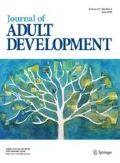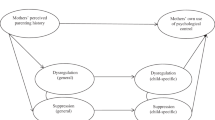Abstract
This study examined the relations between maternal parenting styles (including warmth, behavioral control, and psychological control) and young adults’ emotion regulation. Participants included 246 young adults from a large Midwestern university, as well as their mothers. Higher levels of maternal control, particularly psychological control, were related to lower levels of young adults’ emotion regulation. This study is among the first to explore the above relations within the context of young adulthood. Limitations and clinical implications are discussed.
Similar content being viewed by others
References
Aunola, K., & Nurmi, J. E. (2004). Maternal affection moderates the impact of psychological control on a child’s mathematical performance. Developmental Psychology, 40, 965–978.
Aunola, K., & Nurmi, J. E. (2005). The role of parenting styles in children’s problem behavior. Child Development, 76, 1144–1159.
Barber, B. K. (1996). Parental psychological control: Revisiting a neglected construct. Child Development, 67, 3296–3319.
Barber, B. K., & Buehler, C. (1996). Family cohesion and enmeshment: Different constructs, different effects. Journal of Marriage and the Family, 58, 433–441.
Barber, B. K., & Harmon, E. L. (2002). Violating the self: Parental psychological control of children and adolescents. In B. K. Barber (Ed.), Intrusive parenting: How psychological control affects children and adolescents (pp. 15–52). Washington, DC: American Psychological Association.
Barber, B. K., & Olsen, J. A. (1997). Socialization in context: Connection, regulation, and autonomy in the family, school, and neighborhood with peers. Journal of Adolescent Research, 12, 298–315.
Barber, B. K., Olsen, J. A., & Shagle, S. C. (1994). Associations between parental psychological and behavioral control and youth internalized and externalized behaviors. Child Development, 65, 1120–1136.
Barber, B. K., Stolz, H. E., & Olsen, J. A. (2005). Parental support, psychological control, and behavioral control: Assessing relevance across time, culture, and method. Monographs of the Society for Research in Child Development, 70(4, Serial No. 282), 1–137.
Bradley, S. J. (2000). Affect regulation and the development of psychopathology. New York: Guilford Press.
Crockenberg, S., & Leerkes, E. (2000). Infant social and emotional development in family context. In C. H. Zeanah Jr. (Ed.), Handbook of infant mental health (2nd ed., pp. 60–90). New York: Guilford Press.
Eccles, J. S., Early, D., Frasier, K., Belansky, E., & McCarthy, K. (1997). The relation of connection, regulation, and support for autonomy to adolescents’ functioning. Journal of Adolescent Research, 12, 263–286.
Eisenberg, N., Champion, C., & Ma, Y. (2004). Emotion-related regulation: An young construct. Merrill-Palmer Quarterly, 50, 236–259.
Eisenberg, N., Cumberland, A., & Spinrad, T. L. (1998a). Parental socialization of emotion. Psychological Inquiry, 9, 241–273.
Eisenberg, N., & Spinrad, T. L. (2004). Emotion-related regulation: Sharpening the definition. Child Development, 75, 334–339.
Eisenberg, N., Spinrad, T. L., & Cumberland, A. (1998b). The socialization of emotion: Reply to commentaries. Psychological Inquiry, 9, 317–333.
Erikson, E. H. (1964). Childhood and society (2nd ed.). Oxford: W. W. Norton.
Fauber, R., Forehand, R., Thomas, A. M., & Wierson, M. (1990). A meditational model of the impact of marital conflict on adolescent adjustment in intact and divorced families: The role of disrupted parenting. Child Development, 61, 1112–1123.
Galambos, N. L., Barker, E. T., & Almeida, D. M. (2003). Parents do matter: Trajectories of change in externalizing and internalizing problems in early adolescence. Child Development, 74, 578–594.
Galambos, N. L., & Ehrenberg, M. F. (1997). The family as health risk and opportunity: A focus on divorce and working families. In J. Schulenberg, J. L. Maggs, & K. Hurrelmann (Eds.), Health risks and developmental transitions during adolescence (pp. 139–160). Cambridge, England: Cambridge University Press.
Garber, J., Robinson, N. S., & Valentiner, D. (1997). The relation between parenting and adolescent depression: Self-worth as a mediator. Journal of Adolescent Research, 12, 12–33.
Grolnick, W. S., & Gurland, S. T. (2002). Mothering: Retrospect and prospect. In J. P. McHale & W. S. Grolnick (Eds.), Retrospect and prospect in the psychological study of families (pp. 1–33). Mahwah, NJ: Erlbaum.
Halberstadt, A. G., Cassidy, J., Stifter, C. A., Parke, R. D., & Fox, N. A. (1995). Self-expressiveness within the family context: Psychometric support for a new measure. Psychological Assessment, 7, 93–103.
Hu, L. T., & Bentler, P. M. (1998). Fit indices in covariance structure modeling: Sensitivity to underparameterized model misspecification. Psychological Methods, 3, 424–453.
Kline, R. B. (1998). Principles and practice of structural equation modeling. New York: Guilford Press.
Laible, D. J., & Carlo, G. (2004). The differential relations of maternal and paternal support and control to adolescent social competence, self-worth, and sympathy. Journal of Adolescent Research, 19, 759–782.
Luyckx, K., Soenens, B., Vansteenkiste, M., Goossens, L., & Berzonsky, M. D. (2007). Parental psychological control and dimensions of identity formation in young adulthood. Journal of Family Psychology, 21, 546–550.
Maccoby, E. E., & Martin, J. (1983). Socialization in the context of the family: Parent–child interaction. In E. M. Hetherington (Ed.), Handbook of child psychology: Vol. 4 Socialization, personality, and social development (4th ed., pp. 1–101). New York: Wiley.
McDowell, D. J., Kim, M., O’Neil, R., & Parke, R. D. (2002). Children’s emotional regulation and social competence in middle childhood: The role of maternal and paternal interactive style. Marriage and Family Review, 34, 345–365.
Moilanen, K. L. (2007). The adolescent self-regulatory inventory: The development and validation of a questionnaire of short-term and long-term self-regulation. Journal of Youth and Adolescence, 36, 835–848.
Morris, A. S., Silk, J. S., Steinberg, L., Myers, S. S., & Robinson, L. R. (2007). The role of the family context in the development of emotion regulation. Social Development, 16, 361–388.
Okagaki, L., & Sternberg, R. J. (1993). Parental beliefs and children’s school performance. Child Development, 64, 36–56.
Olson, S. L., Bates, J. E., & Bayles, K. (1990). Early antecedents of childhood impulsivity: The role of parent–child interaction, cognitive competence, and temperament. Journal of Abnormal Child Psychology, 18, 335–345.
Pettit, G. S., Laird, R. D., Dodge, K. A., Bates, J. E., & Criss, M. M. (2001). Antecedents and behavior-problem outcomes of parental monitoring and psychological control in early adolescence. Child Development, 72, 583–598.
Rauer, A. J., & Volling, B. L. (2005). The role of husbands’ and wives’ emotional expressivity in the marital relationship. Sex Roles, 52, 577–587.
Riggio, R. E., & Carney, D. R. (2003). Social skills inventory manual (2nd ed.). Redwood City, CA: Mind Garden.
Roberts, G. C., Block, H., & Block, J. (1984). Continuity and change in parents’ child-rearing practices. Child Development, 55, 586–597.
Schwartz, J. P., Thigpen, S. E., & Montgomery, J. K. (2006). Examination of parenting styles of processing emotions and differentiation of self. The Family Journal, 14, 41–48.
Skowron, E. A., & Friedlander, M. L. (1998). The differentiation of self inventory: Development and initial validation. Journal of Counseling Psychology, 45, 235–246.
Strayer, J., & Roberts, W. (2004). Children’s anger, emotional expressiveness, and empathy: Relations with parents’ empathy, emotional expressiveness, and parenting practices. Social Development, 13, 229–254.
Thompson, R. A. (1994). Emotion regulation: In search of definition. Monographs of the Society for Research in Child Development, 59(2–3, Serial No. 240), 25–52.
Author information
Authors and Affiliations
Corresponding author
Rights and permissions
About this article
Cite this article
Manzeske, D.P., Stright, A.D. Parenting Styles and Emotion Regulation: The Role of Behavioral and Psychological Control During Young Adulthood. J Adult Dev 16, 223–229 (2009). https://doi.org/10.1007/s10804-009-9068-9
Published:
Issue Date:
DOI: https://doi.org/10.1007/s10804-009-9068-9




